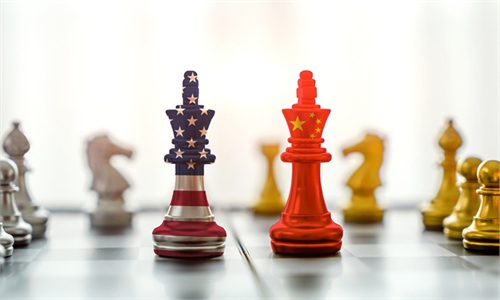China calls on US to remove tariffs, shows willingness to cooperate – with conditions
Beijing willing to cooperate with Washington, but 'hurdles need to be cleared’

Photo:VCG
China hopes the US side will remove unreasonable tariffs on Chinese goods, lift its unilateral sanctions on Chinese companies and research and educational institutes, and abandon its unilateral sanctions of China's technological progress, among other policy adjustments needed to create the necessary conditions for bilateral cooperation, State Councilor and Foreign Minister Wang Yi said on Monday.
The speech marked the first time since the Biden administration took office that Chinese officials have demanded that the US remove tariffs. Observers said that the speech sends a clear signal that Beijing is willing to cooperate, but that there are also "hurdles that need to be cleared" as a precondition for cooperation and charting a path forward for bilateral economic relations.
Wang made the comments at the opening of the Lanting Forum titled "Promoting Dialogue and Cooperation and Managing Differences: Bringing China-US Relations Back to the Right Track" on Monday.
Given the current circumstances, the two sides may start with easier issues, interact actively and build up goodwill, according to Wang.
"China welcomes the greater success of US businesses in China, and will continue to take effective measures to improve our business environment," Wang said.
As COVID-19, climate change and the world economic recovery are the three most pressing tasks for the international community, Wang also noted that China, as a major responsible country, is ready to coordinate policies and work with the US in those areas for the good of the whole word.
Gao Lingyun, an expert at the Chinese Academy of Social Sciences in Beijing who closely follows trade issues, told the Global Times on Monday that as the US has shown it won't interfere with China on major issues of principle, Chinese officials' open remarks could be seen as a goodwill sign that highlights both the prospects and hurdles for cooperation.
It is also expected to play an active and positive role in navigating trade and economic relations between the world's two largest economies, analysts said.
"To re-engage in dialogue, both sides need to put forward their demands before returning to the negotiating table. China is showing such sincerity," Gao said.
"China does not say that the US' move would come with concessions from China. In other words, Beijing is also sending a message to the Biden administration that it needs to correct the wrongdoings of the Trump era unconditionally," He Weiwen, a former senior trade official and an executive council member of the China Society for World Trade Organization Studies, told the Global Times.
But analysts predict that a fresh round of China-US trade talks won't begin very soon, as the key members of US President Joe Biden's economic team have yet to be approved by the Senate.
Biden's commerce secretary and US trade representative picks - who are at the forefront of dealing with Chinese trade policies - have yet to undergo a Senate vote, according to media reports.
Treasury Secretary Janet Yellen said in an interview with CNBC on Thursday that the US will keep in place tariffs imposed on Chinese goods by the former Trump administration, and will "evaluate going forward what we think is appropriate."
Analysts noted that tariffs will remain for some time, and if trade negotiations follow, they will be "extremely tough".
"Conducting a comprehensive evaluation will be the main tone on issues involving China in the short term. We don't expect new trade talks to begin until Biden's administration formulates a systematic economic policy toward China, which is expected to be in the second half of 2021," Gao said.
At the opening speech, Wang also said that with regional hotspot issues and global challenges emerging one after another, areas for bilateral cooperation are expanding rather than shrinking, and prospects for interaction are broadening rather than narrowing.
"More than ever, China and the US are more capable of getting big things done for the benefit of both countries and the world at large," Wang noted.
He added that both countries gain from cooperation and lose from confrontation, and this has been proven time and again by history and in practice since the diplomatic relationship was established.




